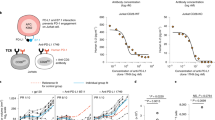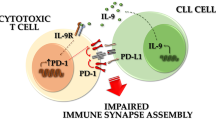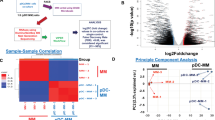Abstract
Bortezomib is a potent drug for the treatment of multiple myeloma. Its anti-tumor activity is mediated by proteasome inhibition leading to decreased cell proliferation and induction of apoptosis. However, an unimpaired proteasomal function plays a crucial role for the induction of anti-tumor immunity by dendritic cells (DCs), which are currently used for therapeutic vaccination against various tumors including myeloma. In the present study, we investigated the impact of bortezomib on the immunostimulatory capacity of 6-sulfo LacNAc (slan) DCs, which represent a major subset of human blood DCs. We demonstrated that this proteasome inhibitor efficiently impairs the spontaneous in vitro maturation of slanDCs and the release of tumor necrosis factor (TNF)-α as well as interleukin (IL)-12 upon lipopolysaccharide (LPS) stimulation. Functional data revealed that bortezomib profoundly inhibits slanDC-induced proliferation and differentiation of CD4+ T cells. In addition, the capacity of slanDCs to promote interferon-γ secretion and tumor-directed cytotoxicity of natural killer (NK) cells is markedly impaired by bortezomib. These results provide evidence that bortezomib significantly reduces the ability of native human blood DCs to regulate innate and adaptive anti-tumor immunity and may have implications for the design of therapeutic strategies combining DC vaccination and bortezomib treatment.
This is a preview of subscription content, access via your institution
Access options
Subscribe to this journal
Receive 12 print issues and online access
$259.00 per year
only $21.58 per issue
Buy this article
- Purchase on Springer Link
- Instant access to full article PDF
Prices may be subject to local taxes which are calculated during checkout






Similar content being viewed by others
References
Adams J . The proteasome: a suitable antineoplastic target. Nat Rev Cancer 2004; 4: 349–360.
Richardson PG, Barlogie B, Berenson J, Singhal S, Jagannath S, Irwin D et al. A phase 2 study of bortezomib in relapsed, refractory myeloma. N Engl J Med 2003; 348: 2609–2617.
Richardson PG, Sonneveld P, Schuster MW, Irwin D, Stadtmauer EA, Facon T et al. Bortezomib or high-dose dexamethasone for relapsed multiple myeloma. N Engl J Med 2005; 352: 2487–2498.
Cavo M . Proteasome inhibitor bortezomib for the treatment of multiple myeloma. Leukemia 2006; 20: 1341–1352.
Richardson PG, Mitsiades C, Hideshima T, Anderson KC . Bortezomib: proteasome inhibition as an effective anticancer therapy. Annu Rev Med 2006; 57: 33–47.
Nencioni A, Grünebach F, Patrone F, Ballestrero A, Brossart P . Proteasome inhibitors: antitumor effects and beyond. Leukemia 2007; 21: 30–36.
Kane RC, Farrell AT, Sridhara R, Pazdur R . United States Food and Drug Administration approval summary: bortezomib for the treatment of progressive multiple myeloma after one prior therapy. Clin Cancer Res 2006; 12: 2955–2960.
Hideshima T, Richardson P, Chauhan D, Palombella VJ, Elliott PJ, Adams J et al. The proteasome inhibitor PS-341 inhibits growth, induces apoptosis, and overcomes drug resistance in human multiple myeloma cells. Cancer Res 2001; 61: 3071–3076.
LeBlanc R, Catley LP, Hideshima T, Lentzsch S, Mitsiades CS, Mitsiades N et al. Proteasome inhibitor PS-341 inhibits human myeloma cell growth in vivo and prolongs survival in a murine model. Cancer Res 2002; 62: 4996–5000.
Rajkumar SV, Richardson PG, Hideshima T, Anderson KC . Proteasome inhibition as a novel therapeutic target in human cancer. J Clin Oncol 2005; 23: 630–639.
Hideshima T, Chauhan D, Richardson P, Mitsiades C, Mitsiades N, Hayashi T et al. NF-kappa B as a therapeutic target in multiple myeloma. J Biol Chem 2002; 277: 16639–16647.
Banchereau J, Steinman RM . Dendritic cells and the control of immunity. Nature 1998; 392: 245–252.
Banchereau J, Briere F, Caux C, Davoust J, Lebecque S, Liu YJ et al. Immunobiology of dendritic cells. Annu Rev Immunol 2000; 18: 767–811.
Guermonprez P, Valladeau J, Zitvogel L, Thery C, Amigorena S . Antigen presentation and T cell stimulation by dendritic cells. Annu Rev Immunol 2002; 20: 621–627.
Moretta A . The dialogue between human natural killer cells and dendritic cells. Curr Opin Immunol 2005; 17: 306–311.
Banchereau J, Palucka AK . Dendritic cells as therapeutic vaccines against cancer. Nat Rev Immunol 2005; 5: 296–306.
Mayordomo JI, Zorina T, Storkus WJ, Zitvogel L, Celuzzi C, Falo LD et al. Bone marrow-derived dendritc cells pulsed with synthetic tumour peptides elicit protective and therapeutic antitumour immunity. Nat Med 1995; 1: 1297–1302.
Nair SK, Heiser A, Boczkowski D, Majumdar A, Naoe M, Lebkowski JS et al. Induction of cytotoxic T cell responses and tumor immunity against unrelated tumors using telomerase reverse transcriptase RNA transfected dendritic cells. Nat Med 2000; 6: 1011–1017.
Hsu FJ, Benike C, Fagnoni F, Liles TM, Czerwinski D, Taidi B et al. Vaccination of patients with B-cell lymphoma using autologous antigen-pulsed dendritic cells. Nat Med 1996; 2: 52–58.
Nestle FO, Alijagic S, Gilliet M, Sun Y, Grabbe S, Dummer R et al. Vaccination of melanoma patients with peptide- or tumor lysate-pulsed dendritic cells. Nat Med 1998; 4: 328–332.
Thurner B, Haendle I, Roder C, Dieckmann D, Keikavoussi P, Jonuleit H et al. Vaccination with mage-3A1 peptide-pulsed mature, monocyte-derived dendritic cells expands specific cytotoxic T cells and induces regression of some metastases in advanced stage IV melanoma. J Exp Med 1999; 190: 1669–1678.
Wierecky J, Muller MR, Wirths S, Halder-Oehler E, Dorfel D, Schmidt SM et al. Immunologic and clinical responses after vaccinations with peptide-pulsed dendritic cells in metastatic renal cancer patients. Cancer Res 2006; 66: 5910–5918.
Reichardt VL, Okada CY, Liso A, Benike CJ, Stockerl-Goldstein KE, Engleman EG et al. Idiotype vaccination using dendritic cells after autologous peripheral blood stem cell transplantation for multiple myeloma – a feasibility study. Blood 1999; 93: 2411–2419.
Reichardt VL, Brossart P . Dendritic cells in clinical trials for multiple myeloma. Methods Mol Med 2005; 109: 127–136.
Demaria S, Santori FR, Ng B, Liebes L, Formenti SC, Vukmanovic S . Select forms of tumor cell apoptosis induce dendritic cell maturation. J Leukoc Biol 2005; 77: 361–368.
Schumacher LY, Vo DD, Garban HJ, Comin-Anduix B, Owens SK, Dissette VB et al. Immunosensitization of tumor cells to dendritic cell-activated immune responses with the proteasome inhibitor bortezomib (PS-341, Velcade). J Immunol 2006; 176: 4757–4765.
Nencioni A, Garuti A, Schwarzenberg K, Cirmena G, Dal Bello G, Rocco I et al. Proteasome inhibitor-induced apoptosis in human monocyte-derived dendritic cells. Eur J Immunol 2006; 36: 681–689.
Nencioni A, Schwarzenberg K, Brauer KM, Schmidt SM, Ballestrero A, Grünebach F et al. Proteasome inhibitor bortezomib modulates TLR4-induced dendritic cell activation. Blood 2006; 108: 551–558.
Naujokat C, Berges C, Höh A, Wieczorek H, Fuchs D, Ovens J et al. Proteasomal chymotrypsin-like peptidase activity is required for essential functions of monocyte-derived dendritic cells. Immunology 2007; 120: 120–132.
Schäkel K, Mayer E, Federle C, Schmitz M, Riethmüller G, Rieber EP . A novel dendritic cell population in human blood: one-step immunomagnetic isolation by a specific mAb (M-DC8) and in vitro priming of cytotoxic T lymphocytes. Eur J Immunol 1998; 28: 4084–4093.
Schäkel K, Kannagi R, Kniep B, Goto Y, Mitsuoka C, Zwirner J et al. 6-Sulfo LacNAc, a novel carbohydrate modification of PSGL-1, defines an inflammatory type of human dendritic cells. Immunity 2002; 17: 289–301.
Schäkel K, von Kietzell M, Hänsel A, Ebling A, Schulze L, Haase M et al. Human 6-sulfo LacNAc-expressing dendritic cells are principal producers of early interleukin-12 and are controlled by erythrocytes. Immunity 2006; 24: 767–777.
Schmitz M, Zhao S, Schäkel K, Bornhäuser M, Ockert D, Rieber EP . Native human blood dendritic cells as potent effectors in antibody-dependent cellular cytotoxicity. Blood 2002; 100: 1502–1504.
Schmitz M, Zhao S, Deuse Y, Schäkel K, Wehner R, Wöhner H et al. Tumoricidal potential of native blood dendritic cells: direct tumor cell killing and activation of NK cell-mediated cytotoxicity. J Immunol 2005; 174: 4127–4134.
Bross PF, Kane R, Farrell AT, Abraham S, Benson K, Brower ME et al. Approval summary for bortezomib for injection in the treatment of multiple myeloma. Clin Cancer Res 2004; 10: 3954–3964.
Lechmann M, Berchtold S, Hauber J, Steinkasserer A . CD83 on dendritic cells: more than just a marker for maturation. Trends Immunol 2002; 23: 273–275.
Feinman R, Hendriksen-DeStefano D, Tsujimoto M, Vilcek J . Tumor necrosis factor is an important mediator of tumor cell killing by human monocytes. J Immunol 1987; 138: 635–640.
Trinchieri G . Interleukin-12 and the regulation of innate resistance and adaptive immunity. Nat Rev Immunol 2003; 3: 133–146.
Pardoll DM, Topalian SL . The role of CD4+ T cell responses in antitumor immunity. Curr Opin Immunol 1998; 10: 588–594.
Toes RE, Ossendorp F, Offringa R, Melief CJ . CD4 T cells and their role in antitumor immune responses. J Exp Med 1999; 189: 753–756.
Wang RF . The role of MHC class II-restricted tumor antigens and CD4+ T cells in antitumor immunity. Trends Immunol 2001; 22: 269–276.
Corthay A, Skovseth DK, Lundin KU, Rosjo E, Omholt H, Hofgaard PO et al. Primary antitumor immune response mediated by CD4+ T cells. Immunity 2005; 22: 371–383.
Blanco B, Perez-Simon JA, Sanchez-Abarca LI, Carvajal-Vergara X, Mateos J, Vidriales B et al. Bortezomib induces selective depletion of alloreactive T lymphocytes and decreases the production of Th1 cytokines. Blood 2006; 107: 3575–3583.
Wehner R, Wendisch M, Schäkel K, Bornhäuser M, Platzbecker U, Mohr B et al. Imatinib mesylate does not impair the immunogenicity of human myeloid blood dendritic cells. Leukemia 2006; 20: 1629–1632.
Sun K, Welniak LA, Panoskaltsis-Mortari A, O'Shaughnessy MJ, Liu H, Barao I et al. Inhibition of acute graft-versus-host disease with retention of graft-versus-tumor effects by the proteasome inhibitor bortezomib. Proc Natl Acad Sci USA 2004; 101: 8120–8125.
Farag SS, Fehninger TA, Ruggeri L, Velardi A, Caligiuri MA . Natural killer cell receptors: new biology and insights into the graft-versus-leukemia effect. Blood 2002; 100: 1935–1947.
Woan K, Reddy V . Potential therapeutic role of natural killer cells in cancer. Expert Opin Biol Ther 2007; 7: 17–29.
Moretta L, Bottino C, Pende D, Castriconi R, Mingari MC, Moretta A . Surface NK receptors and their ligands on tumor cells. Semin Immunol 2006; 18: 151–158.
Yu Y, Hagihara M, Ando K, Gansuvd B, Matsuzawa H, Tsuchiya T et al. Enhancement of human cord blood CD34+ cell-derived NK cell cytotoxicity by dendritic cells. J Immunol 2001; 166: 1590–1600.
Ferlazzo G, Tsang ML, Moretta L, Melioli G, Steinman RM, Munz C . Human dendritic cells activate resting natural killer (NK) cells and are recognized via the NKp30 receptor by activated NK cells. J Exp Med 2002; 195: 343–351.
Frohn C, Hoppner M, Schlenke P, Kirchner H, Koritke P, Luhm J . Anti-myeloma activity of natural killer lymphocytes. Br J Haematol 2002; 119: 660–664.
Carbone E, Neri P, Mesuraca M, Fulciniti MT, Otsuki T, Pende D et al. HLA class I, NKG2D, and natural cytotoxicity receptors regulate multiple myeloma cell recognition by natural killer cells. Blood 2005; 105: 251–258.
Acknowledgements
The technical assistance of Bärbel Löbel is greatly appreciated. This work was supported by grants from the German Ministry of Education and Research and the Medical Faculty, Technical University of Dresden.
Author information
Authors and Affiliations
Corresponding author
Rights and permissions
About this article
Cite this article
Straube, C., Wehner, R., Wendisch, M. et al. Bortezomib significantly impairs the immunostimulatory capacity of human myeloid blood dendritic cells. Leukemia 21, 1464–1471 (2007). https://doi.org/10.1038/sj.leu.2404734
Received:
Revised:
Accepted:
Published:
Issue Date:
DOI: https://doi.org/10.1038/sj.leu.2404734
Keywords
This article is cited by
-
On the role of the immunoproteasome in transplant rejection
Immunogenetics (2019)
-
Selective apoptosis of monocytes and monocyte-derived DCs induced by bortezomib (Velcade)
Bone Marrow Transplantation (2009)
-
The proteasome inhibitor bortezomib depletes plasma cells and protects mice with lupus-like disease from nephritis
Nature Medicine (2008)



